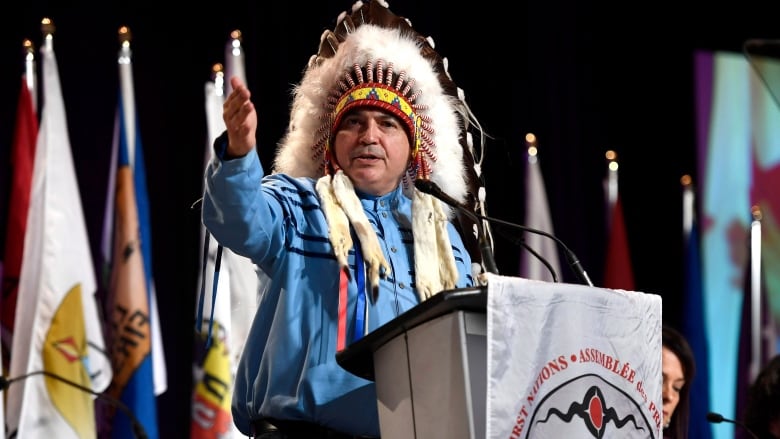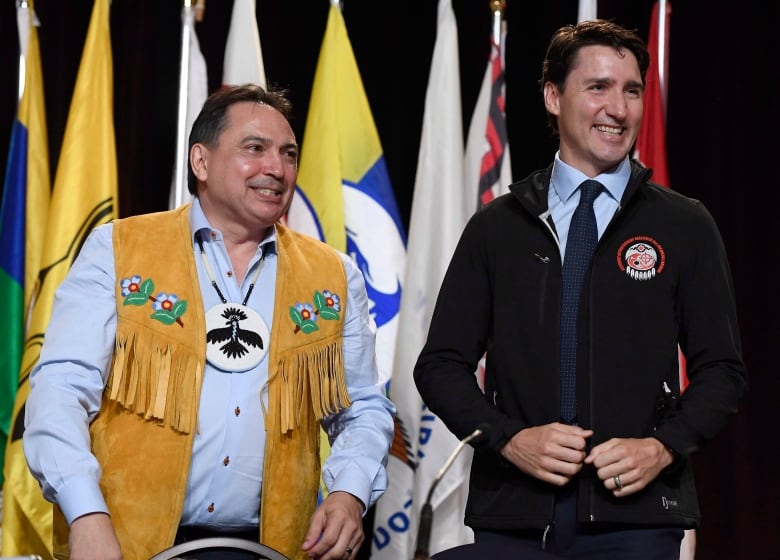AFN national chief says senators should not be 'afraid' of Indigenous rights bill
Perry Bellegarde wants speedy passage of 2 major bills set for introduction in January

Assembly of First Nations National Chief Perry Bellegarde said Conservative senators should not be "afraid" and pass an NDP private member's bill to harmonize Canada's laws with the UN Declaration on the Rights of Indigenous Peoples.
Bill C-262, introduced by NDP MP Romeo Saganash, is currently in second reading before the Senate.
Conservatives opposed the bill in the House of Commons and, in the Senate, expressed concern over its potential impact during a Senate debate in late November.
Sen. Scott Tannis said during a debate in late November he was concerned the UN declaration — which requires governments to get "free, prior and informed consent" before doing anything that affects Indigenous rights or territory — suggested First Nations should have a "veto" over resource development projects.
"My message to the Conservatives would be that this is good for Canada... it's a road map for reconciliation," said Bellegarde, in a year-end interview with CBC News. "Don't be afraid of free, prior and informed consent; it just means working together so we can find a balance between the environment and economy."
Bellegarde said he is also looking for speedy passage to two other major pieces of legislation important to First Nations.
Prime Minister Justin Trudeau recently told AFN chiefs his government would, by the end of January, introduce a bill to preserve and promote Indigenous languages, and another aimed at granting Indigenous control and jurisdiction over child welfare services.
With Parliament set to rise in June, there is only a small window to pass both bills before the federal election in October 2019.
"Studies have shown that when a First Nation person is fluent in their language, they are more successful in school and therefore more successful in life," said Bellegarde. "Even getting behind the Indigenous languages bill or act is investing in human capital."
On the promised Indigenous child welfare bill, Bellegarde said something needs to be done to reverse the current trend that sees about 40,000 First Nation children in foster care across the country.
"It's a human rights travesty," said Bellegarde. "It's very important to get passed."

Bellegarde said there is a political price to pay for parties that frustrate legislation positive for First Nation people or ignore them in their platforms.
Bellegarde said the First Nation vote flipped about 21 ridings in the last federal election.
"First Nation people know the power of voting in federal elections now," said Bellegarde. "We want to ensure all federal parties have a strong piece in their platforms as it relates to First Nation issues, and we should not be ignored in any of that, if they want to form government."
On the Trudeau government's proposal to enshrine Aboriginal rights, as spelled out in the Constitution, into federal law, Bellegarde doubts that it will return in the form it was initially proposed.
Trudeau announced plans to table the recognition of rights framework in February and it was expected to be introduced this fall. But the government postponed those plans after facing a backlash from First Nation leadership.
"Our perspective is that it can't be done unless we drive that and we are not driving it right now," said Bellegarde.
"I don't see that being introduced in the near future at all."

